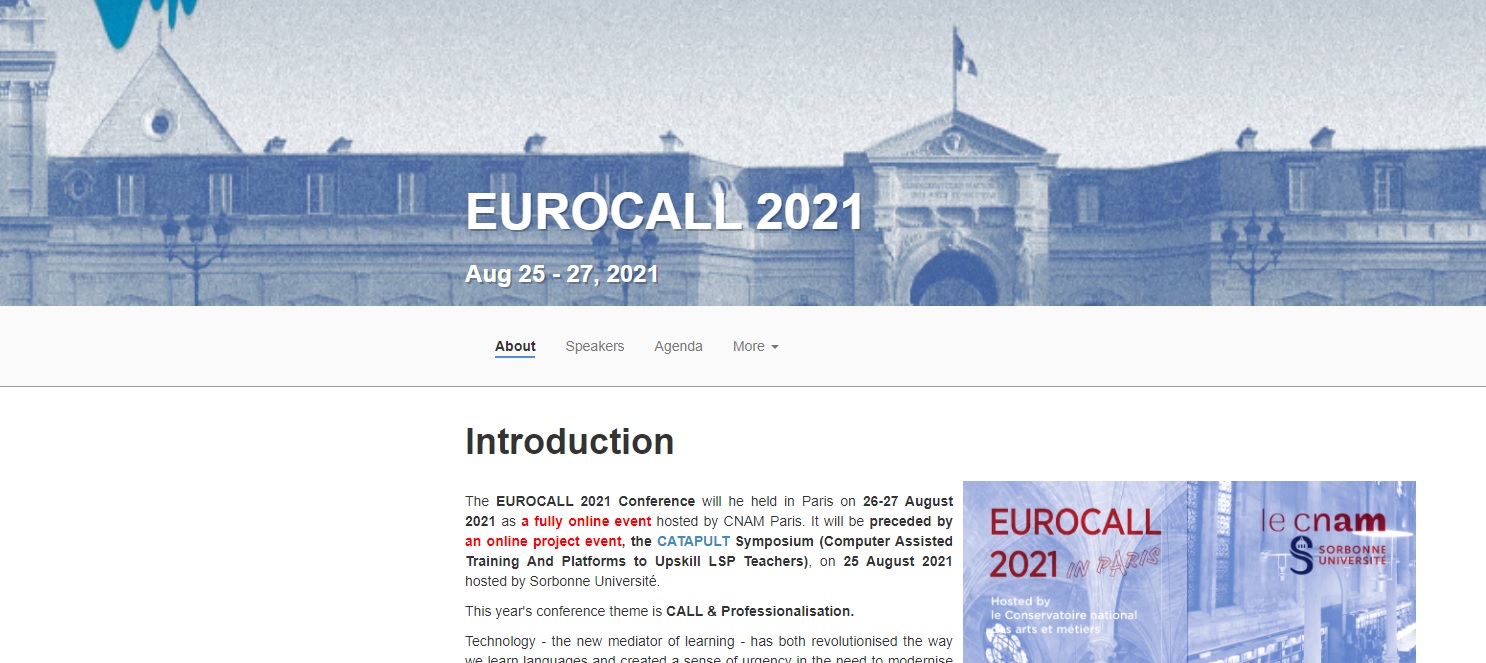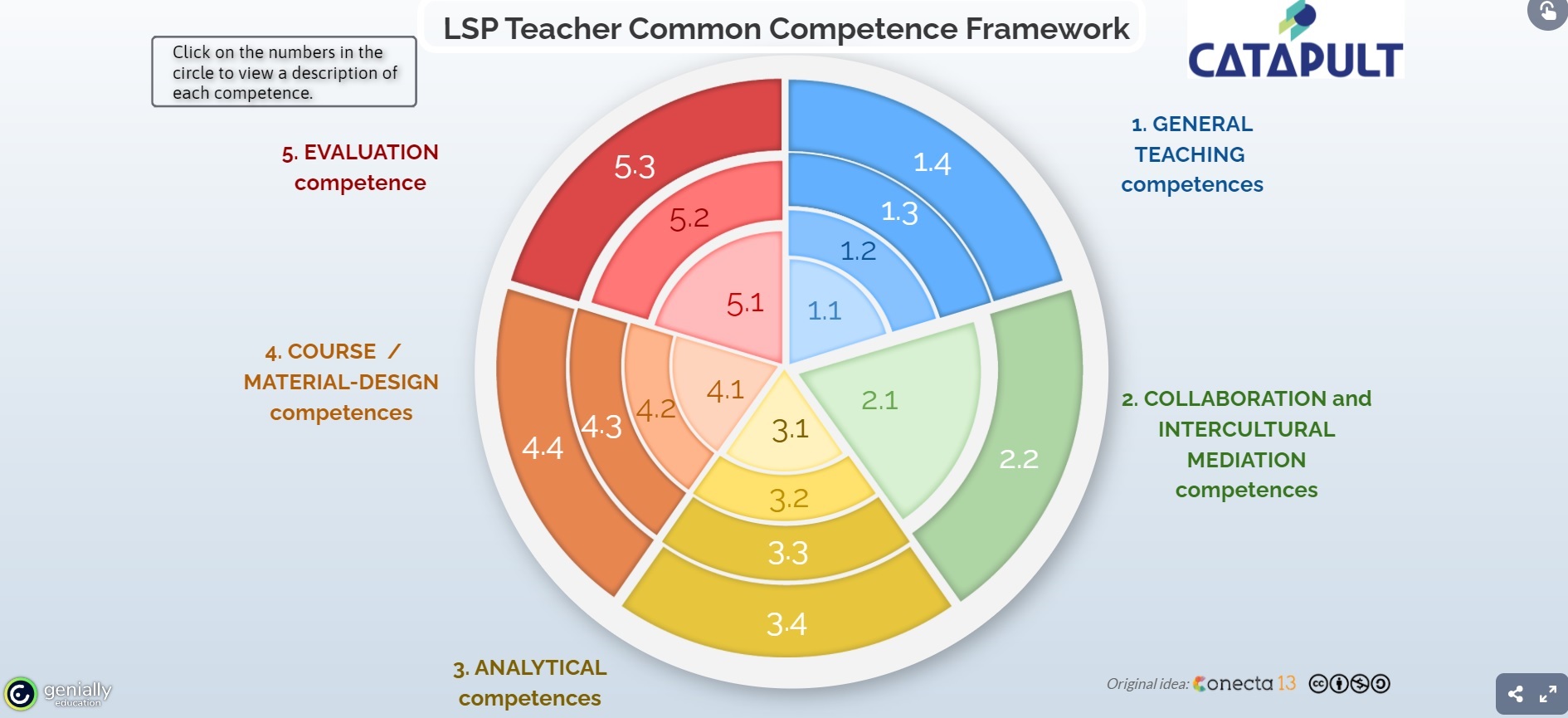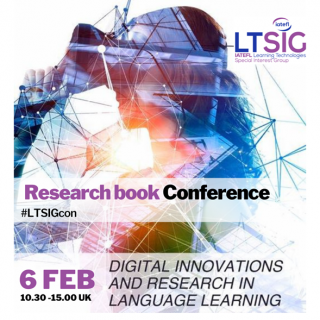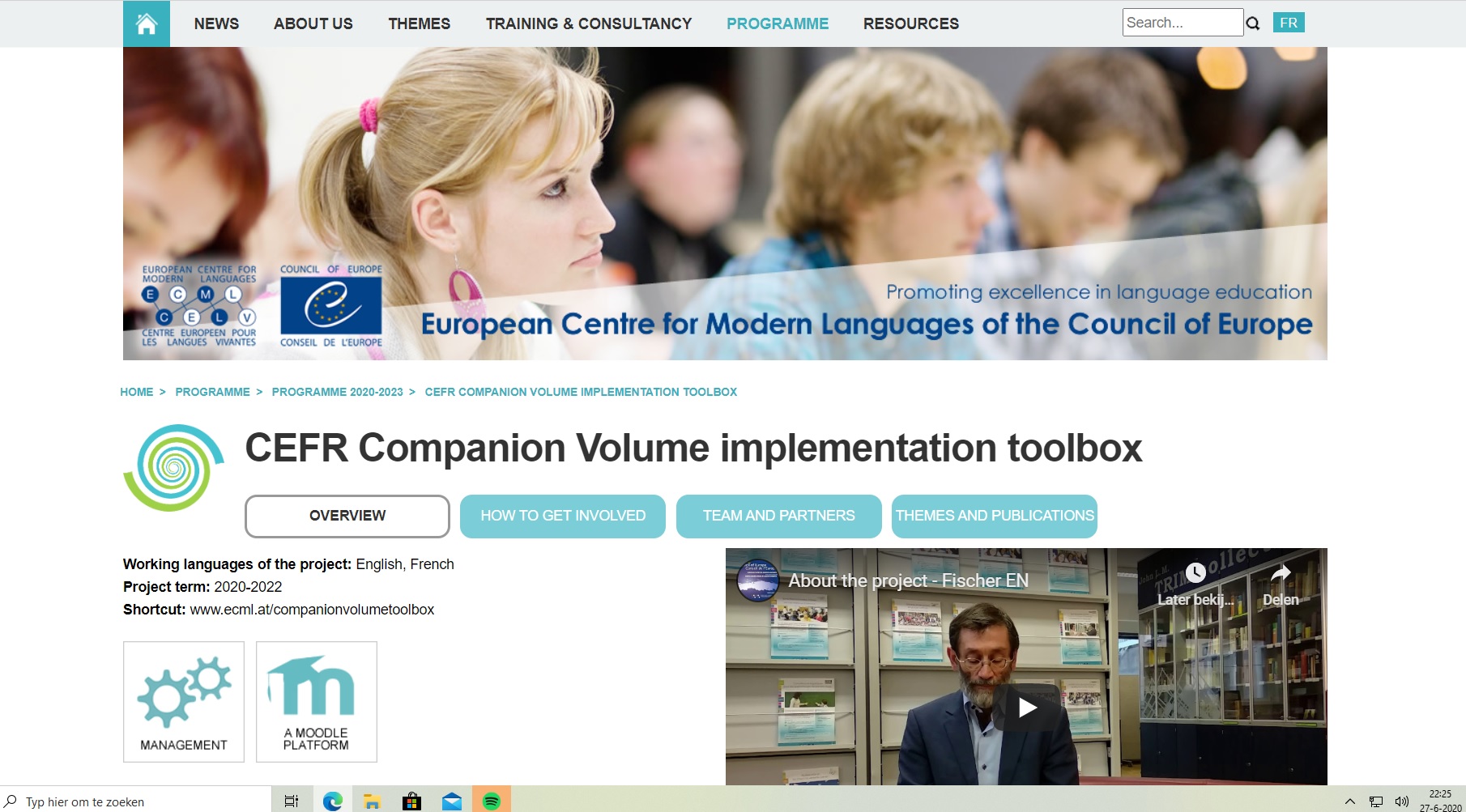There are platforms coming up that use virtual reality in language learning. For example, you have Panolingo, ImmerseMe, Mondly AR… I have to say that I am not really into this kind of things, but it could be that I’m just to old:) I wonder if you guys have any experience with this kind of apps. And if so, do you believe they form a threat for language teachers? Or would it be possible to integrate this kind of tools in you teaching practice? Please, let us know.
Free publication: CALL and professionalisation: short papers from EUROCALL 2021 conference
Eurocall 2021 conference proceedings available here
Below my pre-conference recommendations for attending and/or viewing prerecorded sessions for the CATAPULT LSP community
DDL, LSP, and formative assessment: a case study on the language of Mathematics
by Elisa Corino (Speaker)University of Turin
Recorded Video: Watch video
A toolkit for online language teachers
Zsuzsanna Bárkányi(Speaker)
Christine Pleines(Speaker)The Open University, Lecturer
Recorded Video: Watch video
The HERO Project: Language Training for migrants’ professional career as caregivers through blended learning
Maria-Victoria Soule (Speaker) Cyprus University of Technology, Researcher and Spanish Language Instructor
Enhancing EFL teachers’ professionalism in teaching speaking: a help from automatic speech recognition technology
by Muzakki Bashori (Speaker)Radboud University Nijmegen, PhD student
Description
Two of the main problems that EFL teachers in Indonesia encounter when teaching speaking in their classroom are (a) lack of speaking activities with feedback (Ariatna, 2016; Cucchiarini & Strik, 2019) and (b) students’ moderate to serious level of Foreign Language Speaking Anxiety (FLSA) (Bashori et al., 2020), which considerably affects their language achievement and performance (Teimouri et al., 2019; Botes et al., 2020). Teachers need to overcome these two issues to enhance their professionalism in teaching speaking and help students improve their speaking skills. One overarching solution, especially for today’s students known as Generation Z (González-Lloret & Ortega, 2014), is by incorporating technology in the curriculum. A technology that could be used for this purpose is Automatic Speech Recognition (ASR). For example, by incorporating ASR in specific websites for speaking activities, additional practice and feedback could be provided. To investigate the feasibility of implementing this technology at school, we asked five EFL teachers to try out two website prototypes equipped with ASR. We also interviewed the teachers afterwards. All the teachers reported that technology-enhanced language learning offered benefits to secondary school students. They mentioned that it is possible to integrate the web-based applications with the school’s learning materials. The applications could support teachers in providing clearer or more standardized speaking examples. However, the teachers underlined some drawbacks such as that the programs could only be administered in a classroom equipped with computers or laptops and internet connection. Despite this fact, we believe that in the future, more schools in Indonesia will afford computers or laptops and internet connection, so that this technology will remain helpful for both teachers and students. Additionally, we argue that ASR technology will help teachers reduce students’ level of FLSA. To investigate to what extent this technology can help reduce students’ level of FLSA, we invited 232 secondary school students to participate in our quasi-experimental study. They were divided into three groups; control group (n=86), experimental group A (n=67), and experimental group B (n=79). The experimental groups received ASR-based treatment; the group A used I Love Indonesia, while the other tried NovoLearning. A control group did not receive any web intervention and only attended regular classes. The questionnaire on FLSA (modified from Horwitz et al., 1986) was administered before and after the treatment (for the experimental groups) or the regular classes (for the control group). The results showed that students who received the ASR-based treatment (ILI and NOVO) outperformed those of the control group, with respect to reducing FLSA. Based on this promising outcome, we think that EFL teachers in Indonesia should utilize ASR technology to help them be more professional in teaching speaking, especially in terms of providing more oral practice for students and reducing students’ level of FLSA.
Keywords: professionalism, speaking, foreign language speaking anxiety, automatic speech recognition
Technology-mediated professional simulations for developing professional language skills and intercultural competence: Reflection on success factors for design and implementation
Speakers
- Naiyi Fincham(Speaker)University of Hawaii at Manoa, Assistant Faculty Specialist
- Julio Rodriguez (Speaker)National Foreign Language Resource Center, University is Hawai`i at Mānoa, Director
Open Educational Resources for self-training on the use of corpora for Spanish language teaching: an evaluation
- Rocío Díaz-Bravo(Speaker)Universidad de Granada, Lecturer in Spanish Linguistics
- Magdalena Abad Castelló(Speaker)Instituto Cervantes Manchester, Profesora y formadora
Reflections of Teaching and Learning from the Perspective of Digital Humanities: A Case of an ESP Course “Professional Communication Skills”
Speakers
- L Cheng (Speaker)Beijing University of Posts and Telecommunications
- Jing Yang (Speaker)Beijing University of Posts and Telecommunications
The development of soft skills within recorded business meetings by Tourism ESP students in lockdown times
Abstract:
As Tito-Maya and Serrano explain, we live in a society which is “based on information, rapid change, globalization, and technology” (2016: 59) and these changes have directly affected the job market. Broadly speaking, being able to demonstrate certain soft skills like creativity, teamwork, negotiation techniques, problem-solving or leadership is positively valued by employers when recruiting new employees. Moreover, it is important for Spanish Tourism undergraduates to learn not only how to speak English fluently but also to become familiar with authentic language they will use in their future jobs (Medrea and Rus, 2012; González-Ramírez, 2015).
In this study we will describe a group-project in which Tourism undergraduates record a video simulating a business meeting. It is an adaptation of the activity Deciding the theme of a trade stand fair in the textbook Tourism 3 (Walker and Harding, 2009: 15). In previous academic years, the students met in person to record the meeting; however, due to the current pandemic and social restrictions in Spain, this year they were required to use video-conferencing systems instead. The main objective of the meeting was to discuss and choose a theme and design for a stand to take to several trade fairs. Each group was formed by four people (chairperson + marketing, development and administration representatives) and each character had different functions (e.g, the chairperson should control the time, go over the agenda, recap the main decisions made, ensure everyone has the chance to give their opinion, handle distractions and disagreements…).
The main aims of this study are: a) to identify and describe the soft-skills these students put into practice in their videos; and, b) to analyse the vocabulary and expressions they use to: 1) develop different soft-skills and, 2) perform the main functions and scenes within the video.
In broad terms the main soft skills these students enhanced were leadership, creativity, decision making, problem-solving, negotiation techniques, time-management, collaboration and team-work, their communicative skills and the ability to listen to others. In addition, they perfectly adapted to the use of videoconferencing systems for recording the video and hence, this project also helped them improve their digital competencies. Moreover, the results obtained indicate that they have both learnt and put into context most of the vocabulary we taught them throughout the semester in order to fulfil the main parts and functions within a business meeting: asking for and giving one´s availability, going over the agenda, asking about the previous meetings´ minutes, summarizing decisions, agreeing and disagreeing, negotiating, suggesting ideas, controlling time, small talk…
Examples of the vocabulary used by the students to put into practice the different soft skills and parts of the meeting will be given throughout the presentation. To exemplify, they used expressions like “I can make it on…, I can do…, X works best for me…” to give their availability and “considering the time we have been doing business together…; that is still too expensive for us…, a pleasure doing business with you…, we have a deal…” for negotiating prices with a supplier.
Yolanda Joy Calvo Benzies(Speaker)University of the Balearic Islands, Tenure-track contract Lecturer with a PhD
Preparing expert learners for the world of work by encouraging mediation via technology: relying on students’ online informal practices in a distance LanSOD course for Economics and Management students
Description
The idea of mediation, as well as being a key term with regards to technology, is seen as one of the main additions to the Companion Volume for the Common European Framework of Reference for Languages. This newly developed competence “combines reception, production and interaction” (Council of Europe, 2018: 33), linguistic activities which can be naturally fostered via technology.
Our reflective practice presentation will look at the applicability of the two main additions to the Companion Volume – the mediation competence and online interaction – through the integration of students’ informal practices into the formal context of an online course. The exclusively distance aspect of this course is particularly relevant given the fact that the terms “online” and “Internet” were close to absent in the CEFR in 2001 and are now present 291 and 39 times respectively. The presentation is based on the course’s contents, interactions between students and their representations collected via questionnaires and interviews.
Tasks and resources are significant to students’, as they are linked to a field which is known to them, whilst representing sufficiently close to real life situations, but also because they resemble what students read, look at and do online in their spare time (Sockett, 2014). Practices are incorporated through the course’s activities, contents, and interaction modalities: watching films or videos in English, translated by the use of profession-based fiction, or FASP (Petit, 1999), reading blog posts, news articles, social media posts online, encouraged by our tasks, and communicating online, apparent through the production of tasks and interaction via the course’s forum. All of these practices are made possible by the affordances of technology. This double familiarity should put students in the position of expert learners, who become the holders of knowledge (Chaplier, 2011) as they are already experts of their own practices and budding experts in their field of study, which is inherent to the course’s contents. Our presentation shows how this fosters competences such as mediation strategies, “mediating concepts” and “mediating a text” skills. (Council of Europe, 2018)
As it happens, mediation is linked to FASP in several studies on its use as an English for Specific Purposes teaching tool, as filmic FASP is considered a linguistic, cultural, pedagogical and technological tool (Le Cor, 2010), which reproduces discourses and behaviour specific to the illustrated field and workplace, making it useful learning material in terms of professional discovery and development. Our choice of films from the finance and banking field allows for “ethically acute questions” (Rémon, 2013) to naturally arise, encouraging critical thinking from students about problems or dilemmas they could face, and this is seen as key in the business field (Rajapaske, 2019). Finally, the tasks’ online format and the interaction around them require information and digital literacy skills (Horton, 2008), as they present students with activities and documents relevant to the workplace, thus fostering creativity and the use of digital tools, necessary skills on the job market in the 21st century.
Speaker Lily Schofield, Université de Paris, PhD student
Watch video
ENETCollect – European Network for Combining Language Learning with Crowdsourcing Techniques
and related projects, e.g.
Home – CALLector project – UNIGE
Relevance of multimodal communicative competence and semiotic skills for professional legal English
Speaker: Carmenne Kalyaniwala(Speaker)Atilf-CNRS and Unversity of Lorraine, Associate professor
Online Communication and ESP Mediation through Collaborative Journal Writing
Soraya Garcia-Sanchez (Speaker) Universidad of Las Palmas de Gran Canaria, Associate Professor
Teacher-Student Relationship in a Blended Community of Practice Based on the Course of Professional Applications
Guided by the theories of Language Socialization and Community of Practice, this study investigated the mediating effects of the teacher-student relationship in a 2-term course “Professional Applications” in a joint double-degree programme between at a university in Beijing and a university in London. The study lasted for 10 months from September of 2020 to June of 2021. 185 Year-2 engineering students volunteered to participate in this study. Data included students’ online exchanges, a survey and focused group interviews. Results showed that four types of teacher-student relationship were identified. Moreover, teacher-student relationship had positive influence on the participants’ academic performance. Furthermore, data analysis revealed the dynamics among teacher-student relationship, role identity, learner autonomy and student innovation.
L Cheng (Speaker)Beijing University of Posts and Telecommunications
Data-driven learning to improve writing in English for Professional Purposes
Elena Martín-Monje (Speaker)UNED, Professor
Presentation recording
Urgent professionalization in online teaching during COVID-19: Insights from language learners in Turkey, Poland, Republic of North Macedonia and Bosnia and Herzegovina
Speakers
- Elżbieta Gajek(Speaker)University of Warsaw, PhD hab.
- Nihada Delibegovic Dzanic(Speaker)Faculty of Humanities and Social Sciences, University of Tuzla, Dean
Shared inquiry: Developing digitally-informed TEFL skills in cooperation between prospective and in-service teachers
Teachers need subject-specific ICT skills: teaching effectively by using media and supporting their learners in developing subject-specific and universal ICT skills.
In 2016, Germany‘s Standing Conference of the Ministers of Education and Cultural Affairs (KMK) published a strategy paper delineating the responsibility of all subject teachers, including EFL teachers, to provide opportunities for learners to develop ICT skills (Kultusministerkonferenz, 2016).
Yet, the 2018 ICILS data suggests that a third of all 8th graders in Germany only display ICT skills at the two lowest levels, i.e. very basic skills, with less than 2 percent reaching the highest ICT competence level (Eickelmann et al., 2019, p. 13). Only a quarter of teachers in Germany (23.2%) use digital media in their daily teaching (Eickelmann et al., 2019, p. 17).
While teachers can draw on the rich repertoires of CALL research and existing school practice in using media to support teaching the target language, questions regarding how to foster subject-specific digital competencies deserve further attention, both from a practice and from a research perspective (Burger, 2020). Subject-specific digital competencies are those competencies that learners need to support their own learning, to deal with a wide range of target language texts, and to communicate effectively in a wide range of settings, including multimodal and multilingual settings, in an age of digitalization.
The DigiTeam project (a subproject of the Digi_Gap project cluster) is a cooperation between the TEFL and the Educational Science department at Goethe-University Frankfurt Main. It aims at providing prospective and in-service EFL teachers with knowledge and skills that we assume to be supportive to teach effectively and efficiently with digital media in the EFL classroom. This will be realized through hybrid teaching materials and cooperations between students in TEFL classes, students in Educational Science classes, , students of educational science, and EFL teachers, who will develop, conduct and evaluate media-informed lessons together in an inquiry-based learning tradition.
The project as a whole follows design-based research principles, stressing continual improvement of the design through feedback across multiple iterations. In this presentation, we will discuss preparatory work done focusing on training needs and preferences in the field of „digitalization in the EFL classroom“, plus pilot results from first (partial) implementations of project components.
Recorded Video: Watch video
Judith Buendgens-Kosten, Ilonca Hardy, Daniela Elsner
Teachers need subject-specific ICT skills: teaching effectively by using media and supporting their learners in developing subject-specific and universal ICT skills.
In 2016, Germany‘s Standing Conference of the Ministers of Education and Cultural Affairs (KMK) published a strategy paper delineating the responsibility of all subject teachers, including EFL teachers, to provide opportunities for learners to develop ICT skills (Kultusministerkonferenz, 2016).
Yet, the 2018 ICILS data suggests that a third of all 8th graders in Germany only display ICT skills at the two lowest levels, i.e. very basic skills, with less than 2 percent reaching the highest ICT competence level (Eickelmann et al., 2019, p. 13). Only a quarter of teachers in Germany (23.2%) use digital media in their daily teaching (Eickelmann et al., 2019, p. 17).
While teachers can draw on the rich repertoires of CALL research and existing school practice in using media to support teaching the target language, questions regarding how to foster subject-specific digital competencies deserve further attention, both from a practice and from a research perspective (Burger, 2020). Subject-specific digital competencies are those competencies that learners need to support their own learning, to deal with a wide range of target language texts, and to communicate effectively in a wide range of settings, including multimodal and multilingual settings, in an age of digitalization.
The DigiTeam project (a subproject of the Digi_Gap project cluster) is a cooperation between the TEFL and the Educational Science department at Goethe-University Frankfurt Main. It aims at providing prospective and in-service EFL teachers with knowledge and skills that we assume to be supportive to teach effectively and efficiently with digital media in the EFL classroom. This will be realized through hybrid teaching materials and cooperations between students in TEFL classes, students in Educational Science classes, , students of educational science, and EFL teachers, who will develop, conduct and evaluate media-informed lessons together in an inquiry-based learning tradition.
The project as a whole follows design-based research principles, stressing continual improvement of the design through feedback across multiple iterations. In this presentation, we will discuss preparatory work done focusing on training needs and preferences in the field of „digitalization in the EFL classroom“, plus pilot results from first (partial) implementations of project components.
Speaker Judith Buendgens-Kosten(Speaker)Goethe University Frankfurt
Potential and Limitations of Machine Translation to Learn English: the Case of Apprentice Engineers
Recorded Video: Watch video
Speaker Amelia Rucart Rus (Speaker)CNAM Paris, Foap Laboratory, Phd Student
CALL and Professionalisation tools: impact of the game-based website ‘Check your Smile’ on specialized terminology acquisition and motivation
Description
Keywords: serious games, terminology acquisition, English for specific purposes.
Computer Assisted Vocabulary Learning, i.e. specialized terminology acquisition is a major tool to learning Languages for Specific Purposes (LSP), necessary to students’ professionalization. One current area of research is digital game-based language learning, because of its motivating qualities. This paper discusses electronics students’ acquisition of specific vocabulary as related to the free game-based collaborative platform, Check your Smile (CYS), which is entirely devoted to learning LSP terminology. CYS aggregates various types of games, which automatically generate individualized game plays drawing upon a collaboratively constructed multilingual dictionary. The study focuses on multiple variables including attending a selective engineering course taught in English and the language used to teach the mandatory electronics class. Empirical data shows that, independent of other variables, students having used CYS tend to obtain better vocabulary test scores than students who did not.
Speaker Nadia YASSINE-DIAB (Speaker)University Toulouse III Paul Sabatier, Assistant Professor
‘For actual, proper study, and schoolwork, I wouldn’t use my phone at all really’: Finding a role for smartphones within the traditional concept of study among Irish learners of other languages
This presentation will report on the findings and recommendations of a study of students of modern languages at an Irish university which investigated their uses of and perceptions of smartphones as language learning devices.
The students held clear and narrow, traditional concepts of what ‘actrual proper study’ comprises, and their use of smartphones within that perception was limited and peripheral.
Speaker Martin Mullen(Speaker)University of Limerick
Intelligent personal assistants in L2 education: Alexa, did I pronounce that right?
Speaker Souheila Moussalli (Speaker)Concordia University
Speaking to write: Examining language learners’ acceptance of automatic speech recognition as a writing tool
Speaker Carol Johnson(Speaker)Concordia University
Teaching ESP online, blending Formal, Non-formal and Informal contexts. Examples from online courses in undergraduate Social Sciences
Description
In this talk we will be arguing a big-picture view that “CALL means learners learning language in any context with, through and around computer technologies” (Egbert 2005). For us this means that much CALL is informal learning through the host of leisure activities which now involve English, as young people get their daily fix of vlogs, series and multiplayer games. From a microscopic point of view we will be talking about what this means in our day to day work of designing ESP courses for students in French Universities.
Speakers
- Denyze TOFFOLI (Speaker)Université de Toulouse III – Paul Sabatier, Professeure / Professor English and Applied Linguistics
- Geoffrey Sockett (Speaker)Université de Paris, Professor of Language Sciences
TextMix: Using NLP and APIs to generate chunked sentence scramble tasks and encourage syntactic awareness
Speaker: Brendon Albertson, Assistant Professor of English Language Learners & Foundational Learning, Pine Manor College
Scaffolding autonomous language learning for teachers and learners: the development of online resources for LSP within the CORALL project
Description
Authors: Agnes Pal; María del Carmen Arau Ribeiro; Réka Asztalos; Ilona Buchem; Aleksandra Sudhershan; Alexandra Szenich; Tanja Vesala-Varttala
Abstract:
Fostering learner autonomy, while more often than not difficult for language professionals due to the essential critical re-evaluation of their teaching methodology and previous experiences, poses equally significant challenges for language learners. Learner autonomy was seen as the holy grail in the field of foreign language education even prior to the dramatic developments of 2020 but finding the delicate balance for scaffolding appropriately and growing learner responsibility has understandably become even more challenging under the physical, social and methodological constraints imposed by the pandemic. In this light, individual teachers have often been forced to rely on their own ingenuity and resourcefulness to put this complex concept into practice. The difficulties posed by the requirements of the time and effort needed to find suitable resources and materials correspond directly with the partnership production of open educational resources within the CORALL Erasmus+ partnership to develop Coaching-oriented Online Resources for the Autonomous Learning of LSP (Erasmus+ Strategic Partnerships for Higher Education 2019-1-HU01-KA203-061070). The online modules aim to support both teachers and learners of Spanish, English and German in developing a wide variety of components associated with learner autonomy and are in various phases of creation, testing, and piloting. These include, among others, modules for developing the social aspect of learner autonomy, for lexical and semantic growth in a communicative context, and for self-assessment of competences in mediation and interaction. The conference is an opportunity to work with the results of the piloting stage and the insights gained as well as some of the tools developed so far. The chance to engage further with the committed EUROCALL conference participants may provide further opportunities for feedforward with the ongoing project which is tasked with empowering students in the language classroom and beyond.
Speakers
- Reka Asztalos(Speaker)Budapest Business School, University of Applied Sciences, Department of Languages for Business Communication, Senior lecturer
For more info about the project and the recording of the presentation see this LinguaCoP resource page on LSP related EU projects
Language of Engineering : A corpus based investigation into disciplinary variation
Aysel Şahin Kızıl (Speaker)
The CLIL Open Online Learning project (2018-2022)
Speakers
- Caoimhín Ó Dónaill (Speaker)Ulster University, Senior Lecturer
- Ana Gimeno (Speaker)Universitat Politècnica de València, Professor of English and Applied Linguistics
Selection of recent Apps to support practising speaking , vocab development and more…
‘One Day CATAPULT Workshop in Teaching Languages for Specific Purposes in Adult and Higher Education’.
ICC Home Page: http://www.icc-languages.eu/
IATEFL Learning Technologies SIG free online conference, Feb. 6
| IATEFL LTSIG Research Book Conference
IATEFL Learning Technologies SIG would like to invite you to their online conference to explore the studies published in our recent book Digital Innovations and Research in Language Learning (2020).  The authors will present their studies, which explore the pedagogical potential and realities of learning technologies in a wide range of language education contexts, and they will address the developments or applications brought about by the Covid-19 pandemic and the shift to remote teaching and learning. Featuring presentations on topics such as virtual schooling, game-based learning, autonomy, inclusion, academic reading, student empowerment, CPD, and digital responsibility and ethics, this event will provide useful insights into the impact of digital learning in language education.  For full info and abstracts, please see the programme (all times mentioned are UK time). 10.00 Networking The event is free but you need to register. You can register for the event here. Registration does not guarantee a place in the Zoom room. Access will be on a first come first served basis. The event will also be livestreamed on our Facebook Page. We are really looking forward to seeing you there! |
LinguaCoP Resource item ‘ECML – ICT-REV Inventory of ICT tools and open educational resources’ updated
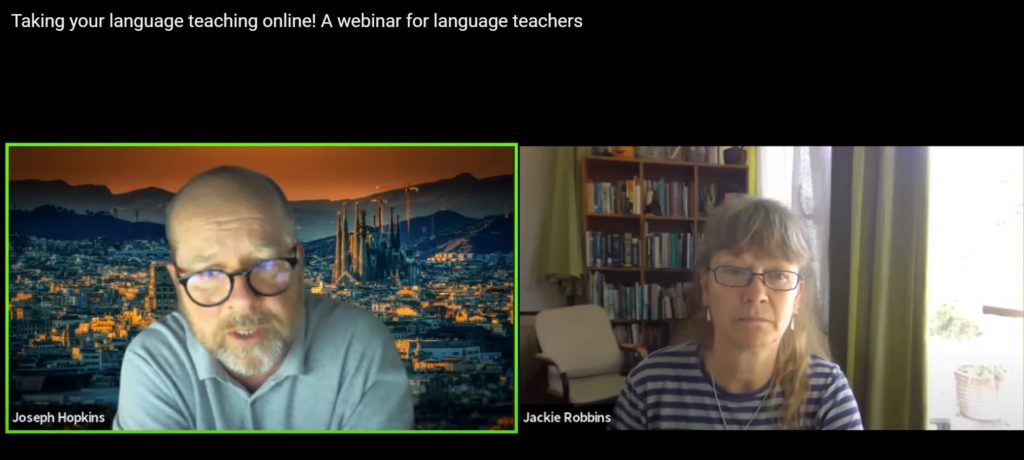 We updated the information about the ICT-REV collection of digital tools for language learning as earlier this year the ICT-REV team ran the international webinar: Taking your language teaching online! A webinar for language teachers
We updated the information about the ICT-REV collection of digital tools for language learning as earlier this year the ICT-REV team ran the international webinar: Taking your language teaching online! A webinar for language teachers
Find links to the webinar registrations of the English, French and German versions there.

